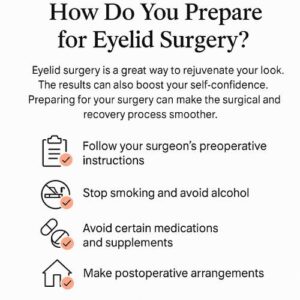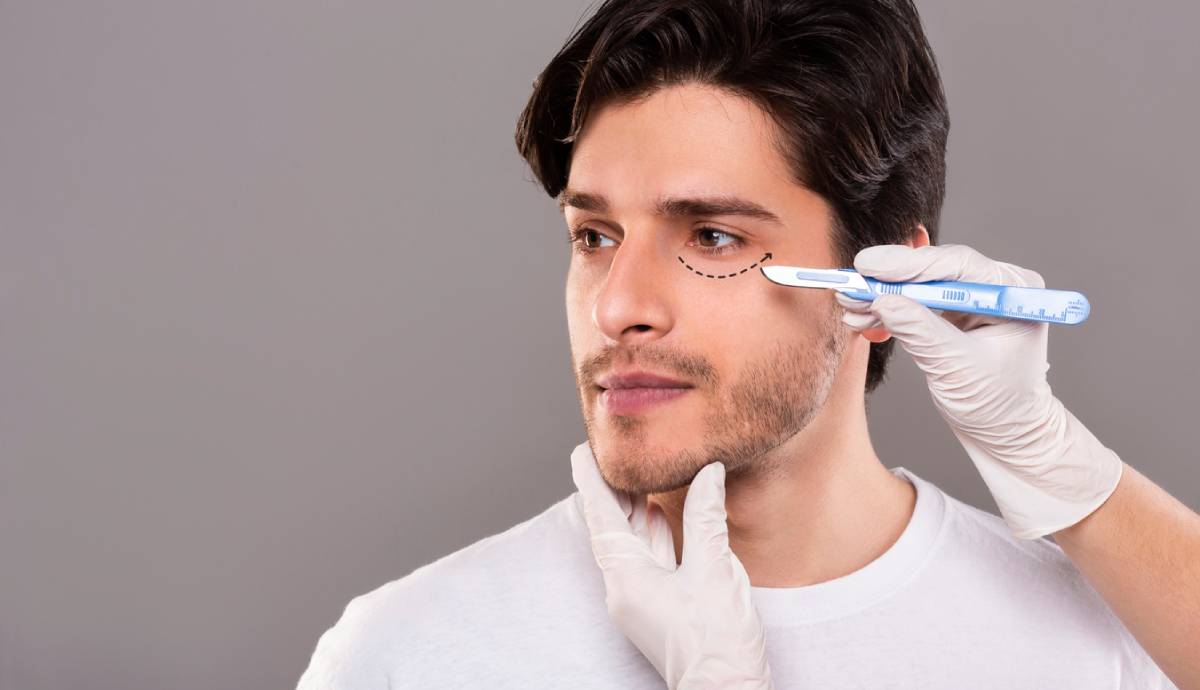Natural aging and poor lifestyle habits can impact the appearance of the eyes in the form of fine lines, wrinkles, under-eye bags, puffiness, and skin sagging. These effects can make you appear older than you are. Even worse, sagging skin can affect your vision and make daily activities more challenging. Eyelid surgery is a popular cosmetic procedure that counters these effects and improves the appearance of the eyes. It’s an excellent procedure for anyone concerned with premature aging, but before diving into the surgery, one must know the answer to the question, “How do you prepare for eyelid surgery?” We address this question below and provide all the information you need to know about preparing for eyelid surgery.
How Do You Prepare for Eyelid Surgery?
Eyelid surgery is a great way to rejuvenate your look. The results can also boost your self-confidence. Preparing for your surgery can make the surgical and recovery process smoother.
Follow Your Surgeon’s Preoperative Instructions

Your oculofacial surgeon will provide you with preoperative instructions. It is critical to follow these exactly. This can help ensure that your surgery proceeds smoothly and improve the recovery experience.
Several preoperative instructions will apply to all patients who undergo the procedure. However, your surgeon is aware of your unique medical history and may have additional instructions based on this. Read the instructions as soon as you get them to avoid delays in your surgery.
Stop Smoking and Avoid Alcohol
If you smoke or drink alcohol, share this information with your oculofacial surgeon at the consultation. You will need to quit smoking, vaping, and any other types of nicotine products before and after surgery. Smoking restricts blood flow and oxygen delivery and can increase the risk of surgical complications and slow down the recovery process. It is best to stop using these substances at least four weeks before surgery.
Alcohol should be avoided at least one to two weeks before surgery. Alcohol acts as a blood thinner, which can lead to excess bruising and swelling. It can also increase the risk of complications related to anesthesia. If you have any questions about nicotine or alcohol use before surgery, consult with your oculofacial surgeon in advance.
Avoid Certain Medications and Supplements
It is important to discuss your current medications and supplements with your oculofacial surgeon. It is best to share this information with them during your consultation. They can advise you on which medications you need to stop or adjust before and after surgery. If you have medications that are necessary for your health, contact your prescribing physician to discuss your options.
The most common medications to avoid include aspirin, ibuprofen, and naproxen. Common supplements to avoid include fish oil, vitamin E, turmeric, and ginkgo biloba. Some of these act as blood thinners. This can increase the risk of bruising and swelling. Avoid taking these medications and supplements at least ten days before the procedure. If you have any questions, discuss them with your surgeon as soon as possible.
Make Postoperative Arrangements
Eyelid surgery is performed on an outpatient basis, meaning that you can go home the same day. However, you cannot drive yourself home. Ask a trusted friend or family member to drive you home and stay with you for the first few days after surgery. It is helpful to have someone monitor your symptoms for the first few days. They can also assist with administering medications and preparing meals. It can be difficult to do this on your own, so have someone you trust help you after surgery.
Set Up Your Recovery Space
The best thing you can do to get back to full health after surgery is to focus on your recovery. This includes resting and being stress-free. Select a quiet location in your home with soft lighting. It is essential to keep your head elevated, so consider using a recliner or a bed with extra pillows. It is helpful to stock up on essentials, including cold compresses, eye drops, sterile gauze, and medications. It is extremely helpful to prepare your meals in advance. Nutrient-dense foods, such as soups and smoothies, are excellent choices.
Clear Your Schedule
Planning for your recovery process is necessary. Be sure to include your recovery spot and have a trusted friend or family member around. However, you should also clear your schedule to minimize stress. It is best to take at least two weeks off. The first week is the most important. However, even when you feel good, taking it easy is the best-case scenario for your recovery. Take time off work, delegate tasks, and limit the number of guests. Investing in the two-week recovery period is necessary for your health and the quality of your eyelid surgery results.
Is Eyelid Surgery Right For Me?
Many people wonder if eyelid surgery is right for them. The best way to determine this is to schedule a consultation with a skilled oculofacial surgeon. They can assess your eyes, review your medical history, and determine if you are a suitable candidate for the procedure. There are two primary types of eyelid surgery. Some patients get just one, while others opt for both.
Upper Eyelid Surgery
Upper eyelid surgery removes the excess skin, fat, and muscle from the upper eyelids. The procedure smooths and tightens the eye area, reducing the appearance of fine lines and puffiness. It can also improve the function of the eyes, as sagging skin can impact vision. This results in a more youthful and awake-looking appearance. This procedure can be combined with a brow lift for optimal results.
Lower Eyelid Surgery
Lower eyelid surgery targets the signs of aging under the eyes. It effectively targets under-eye bags, puffiness, and sagging skin by removing or repositioning excess fat beneath the eyes. The procedure also involves tightening the skin under the eyes to smooth fine lines. The results leave the under-eye area looking smooth and rejuvenated without appearing overdone. This procedure can be combined with laser resurfacing for optimal results.
Eyelid Surgery in Miami
If you are unhappy with the look of your eyes, contact Dr. Jennifer Murdock’s team today to schedule a consultation.

